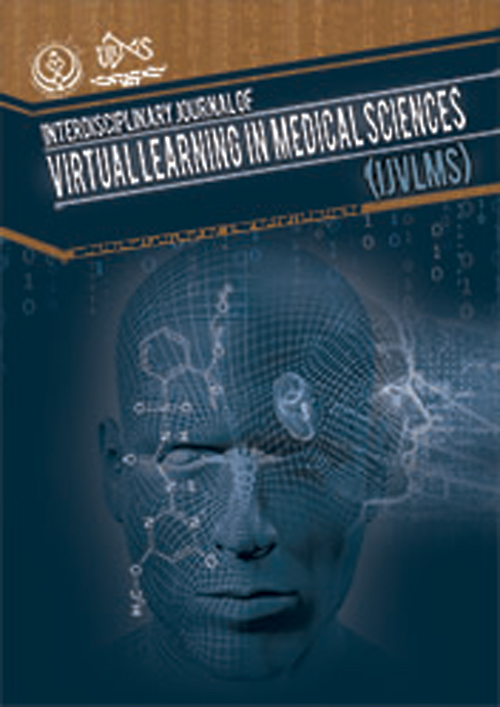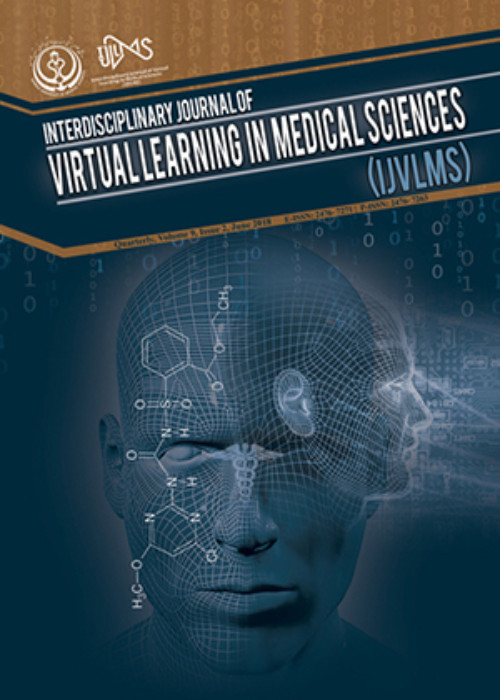فهرست مطالب

Interdisciplinary Journal of Virtual Learning in Medical Sciences
Volume:9 Issue: 3, 2018 Autumn
- تاریخ انتشار: 1397/07/04
- تعداد عناوین: 4
-
-
Page 1BackgroundThe main objective of this paper was to determine the dimensions and components of elites empowerment in interaction with the business environment based on knowledge economy and technology.MethodsThis was an applied developmental study in view of objective and descriptive/observational and survey type with respect to the manner of sampling and data collection. Purposive sampling method was used to choose the participants. The statistical population of the study consisted of 3,000 managers of knowledge-based enterprises throughout Iran, 572 of whom were enrolled in the study. Overall, 362 of the participants responded to the self-made questionnaire, which included 80 items rated using a 5-point Likert scale, and 350 questionnaires were fully completed by the samples and were used for data analysis. The validity of the questionnaire was confirmed by 10 professors of Islamic Azad University. In order to determine its construct validity, the exploratory factor analysis was used, utilizing principal component analysis and varimax rotation. The reliability coefficient of the questionnaire was 0.87. For data analysis, exploratory factor analysis and analytical hierarch process were implemented using SPSS and LISREL tools.ResultsThe results showed that the pattern of elites empowerment in interaction with the business environment based on knowledge economy and technology included the individual (0.260), intra-organizational (0.463), and extra-organizational (0.276) aspects.ConclusionsAmong these aspects, the intra-organizational factor had the greatest impact on the empowerment of elites. Therefore, for the empowerment of elites, executive mechanisms should be prepared in the frame of formulated components.Keywords: Empowerment, Business Environment, Elites, Knowledge Economy, Technology
-
Page 2ObjectiveThe aim of this study was to assess the readiness level of Neyshabur University of Medical Sciences for virtual training development.MethodsThis is a census-based descriptive cross-sectional study conducted in 2017 on 23 employees of Neyshabor University of Medical Sciences who were in the field of e-learning and/or had a virtual learning experience. The research tools included one questionnaire of demographic information and assessment of the readiness of virtual training questionnaire that consist of 18 questions in four areas evaluating the infrastructure, assessment of college resources, assessment of students, assessment of faculty members' readiness, and a question about attitude towards virtual learning. Validity of this questionnaire was confirmed by Najimi and the reliability was confirmed by Cronbach's alpha (0.92). This questionnaire was scored based on a 10-point Likert scale from totally inappropriate to totally appropriate. The data were analyzed with descriptive analytical tests using SPSS 22 software.ResultsThe average total score of the readiness assessment for the development of virtual education on the job position was statistically significant (P = 0.04) while there was no significant difference with other demographic variables such as age, sex, work experience, employment and educational status, and academic degree (P > 0.05). In addition, the average score of the readiness assessment for the development of virtual education was 4.82 ± 1.47 for the participants, which indicates an almost inadequate situation.ConclusionsDue to the approximate readiness of the faculty members and the almost good attitude that exists between the participants in the study, there must be a series of joint planning for achieving short and long term goals for improving the status of university infrastructure and resources, as well as student’s readiness for improving.Keywords: Virtual Learning, Need Assessment, Distance Learning, Education, Medical Sciences
-
Page 3BackgroundThe purpose of this study was to investigate the applicability and necessity of e-learning courses based on the participants’ viewpoints in an e-learning Summer School.MethodsThe research was conducted in 2017 with a descriptive cross-sectional design. The statistical population consisted of 33 students from universities of medical sciences that attended in the first e-learning Summer School and the research was done on all of them. A researcher-made questionnaire with a 5-point Likert scale was used that consisted of 40 questions including 25 questions in the knowledge section with five fields (concepts and theories, instructional design, virtual class, multimedia principles, and new approaches in e-learning) and 15 questions in the skills section with two fields (e-content development and learning management system). Content validity of the questionnaire was approved based on five expert’s opinions and reliability was 94% based on Cronbach’s alpha. The data were analyzed by using SPSS 16 with one-sample t-test, independent t-test, and ANOVA test. Student’s individual experiences were also evaluated by one open-ended question.ResultsAll topics significantly were applicable and necessary from the participants’ viewpoints in both knowledge and skills sections (P < 0.001). The dimension of e-content development had the highest mean score (4.46).ConclusionsE-learning can provide better and easier learning experiences by eliminating the time and space constraints and being adapted to learner conditions. Short-term e-learning courses can create new ideas for the use of technology in the educational process.Keywords: E-Learning, Virtual Education, Course, Medical Students
-
Page 4BackgroundInformation and communication technology (ICT) is the empowerment key to the development of communities, especially in the education system. A smart school refers to educational units, who are flexible for students regarding capabilities and features and prepare learners for the future.ObjectivesThis study aimed at identifying and prioritizing ways to improve teaching-learning process in the second semester of year 2017 - 2018 at smart schools of Semnan province.MethodsThis qualitative study included six experts in information and communication technology in smart schools, and in-depth interviews were carried out with 24 teachers, who were selected by purposive and snowball sampling. The analysis of the content of the interviews and theoretical basis was set in the form of questionnaire in two sections of ideal situation and the status quo. According to experts, content validity and reliability by Cronbach’s alpha had a good condition at 0.88 and 0.96. In the quantitative section, a questionnaire was completed by 310 teachers and administrators, who were selected using stratified sampling.ResultsResult of freedman test for determining the significance of ranking methods of improving teaching- learning showed that it was valid at P < 0.05. The findings showed that teachers (with average of 6) were in the first place followed by interaction (4.48), students (4.41), content (3.11), teaching method (1.58), and evaluation with average of 1.42 stands was in the sixth place amongst factors effecting the teaching-learning process of smart schools.ConclusionsDevelopment of education systems refers to creating fundamental changes in the process of teaching and learning. To enhance these changes, ICT is an empowering key factor. Teaching/learning process includes the teacher, student, and teaching methods. Among these, the teacher has a vital role because they provide information for thinking and reasoning.Keywords: ICT, Smart Schools, Teaching-Learning


